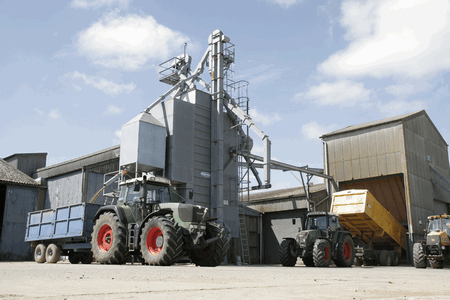Grain drying costs have doubled since 2006

With rocketing energy prices making grain drying costs per tonne twice what they were this time last year, farmers will need to think hard about their grain-store management this harvest. But there are things they can do to try to keep a lid on costs.
That’s the message from Andrew Kneeshaw at FEC Services (formerly known as the Farm Energy Centre). “The trouble is that farmers generally don’t know what they spend on grain drying,” he says. “Often the grainstore and house will all come off the same meter and they haven’t traditionally taken a lot of notice of diesel use.

“But the rise in energy costs means we’re looking at a doubling of drying costs compared with two years ago. So it’s gone from an average of 50p/t to take out each 1% moisture two years ago to £1/t now.
“That means the cost of taking out 3% moisture from a 1000t of grain has risen from £1500 to £3000. People forget that while 60-70% of a farm’s energy use comes from field work like cultivating, drilling and harvesting, the other 30-40% comes from grain storage and drying,” he says.
“It’s now got to a critical stage where people are saying there must be something they can do about it. But there’s no magic wand you can wave – it can often be difficult to do anything – yet you can find that one farmer’s drying costs can be twice those of his neighbour’s.”
Lessons to learn
So what can you do about it? There are no easy answers, but it’s worth thinking about some of the following:
- Don’t over-dry. You obviously don’t want loads rejected by the buyer because the moisture’s too high, but bear in mind that overdrying by 0.5% on 5% extraction on 1000t means you’re wasting £500 (ie 10%) of the £5000 of energy you’re pumping in. Overdry by 0.5% on a 3% extraction rate on 1000t and you’re wasting £480 (ie 16%) of the energy you’ve put in.
- So, if you haven’t got them already, think about fitting automatic controls that monitor grain moisture content. Plenty of firms sell things like temperature and flow controls, humidistats and high-tech temperature probes. It may be too late to do much for this harvest, but high fuel costs aren’t going to go away. Firms like Robydome, Octagon and Farm Electronics may be able to help.
- If it’s an on-floor store, could you install stirrers to reduce the energy needed to shift moisture? They don’t have to be fixed units – Danagri makes a hand-pushed version. Equally, firms like Martin Lishman have pedestal driers that can speed up the process.
- Make sure your grainstore management is as slick as your fieldwork. Take advantage of low humidity levels in August to do as much ambient air blowing as possible.
- Try to work out what your drying costs are. Think about a separate meter for the electricity supply to the grainstore. Your electricity supplier may be able to provide one or you can now buy add-on units.
- FEC Services offers energy audits. There are two versions, a £1000 one that involves an energy use expert coming round the farm and a DIY version that costs £65.
- If you’ve just invested in a new combine, its higher capacity may mean you can be more choosy about when you harvest, says Mark Unitt from drier maker Danagri.
- Keep combining longer in the evening, suggests Oxfordshire farmer Richard Ward. “We find that once the dew starts to fall there’s a tendency to think you have to pack in. However, if you slow down but carry on, after an hour or so the dew seems to soak into the stems and you can speed up again.”
- If you have a continuous-flow drier, think about what fuel you’re using, suggest Charles White from North Yorkshire drier maker Allmet. Kerosene is 6-7p/litre cheaper than red diesel. Converting may involve a new pump, but if you’re drying a lot of grain it could make financial sense. Changing back (if the price differential disappeared) is pretty simple, too.
- Contact your drier maker (if they’re still around – many driers on farms are 30-40 years old and some companies have gone) and see if they have any ideas for cutting fuel use. It may be worth having a service, too, or renewing the burners if they haven’t been changed for ages.
The Farm Energy Event takes place on 25th November at the Newark Showground and will deal specifically with farm energy use; ways to save it, equipment to reduce its use and even ways to generate it.

